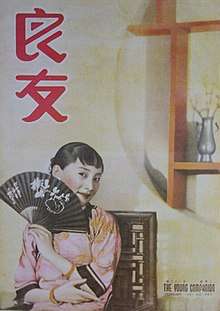Fengzi
Feng Jiren (11 August 1912 – 21 January 1996), known professionally as Fengzi (formerly romanized as Fung Tzu), also known as Feng Fengzi, was a Chinese actress, writer, literary editor, and dramatist. Her second husband was the American-born translator Sidney Shapiro.
Fengzi | |||||||
|---|---|---|---|---|---|---|---|
 Fengzi on the cover of The Young Companion (February 1941) | |||||||
| Born | Feng Jiren August 11, 1912 | ||||||
| Died | January 21, 1996 (aged 83) | ||||||
| Alma mater | Fudan University | ||||||
| Spouse(s) |
| ||||||
| Chinese name | |||||||
| Traditional Chinese | 鳳子 | ||||||
| Simplified Chinese | 凤子 | ||||||
| |||||||
| Birth name | |||||||
| Chinese | 封季壬 | ||||||
| |||||||
In the 1940s, Fengzi did underground work for the Communist Party of China in Shanghai while also working as an actress (in leftist plays and films) and literary editor (for leftist magazines). She was almost arrested by the Nationalist government, but managed to escape to Beiping. In the Korean War, she briefly went to Korea with the People's Volunteer Army. During the Cultural Revolution, due to having worked with Jiang Qing in the 1930s (when Jiang Qing was an actress), Fengzi was severely persecuted and detained for 4 years. She was rehabilitated after the Cultural Revolution.
One of her short stories, "The Portrait" (畫像), written in 1947, has been translated into English by Ann Huss.[1]
Filmography
| Year | English title | Original title | Role | Notes |
|---|---|---|---|---|
| 1940 | My Motherland | 白雲故鄉 | Chen Jingfen | |
| 1948 | Spring Couldn't Be Locked | 關不住的春光 | Mei Chunhua |
References
- Dooling, Amy D., ed. (2005). Writing Women in Modern China: The Revolutionary Years, 1936–1976. Columbia University Press. ISBN 0-231-13216-6.